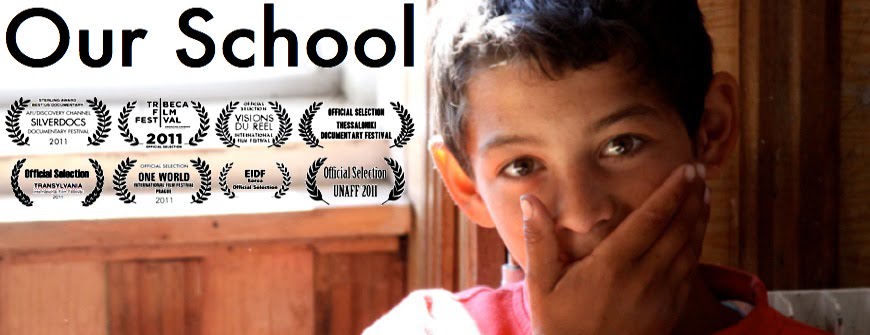[This op-ed by Our School Director Mona Nicoara was originally published on July 28, 2012, by the The Guardian as American Gypsies Needs to Catch up with the Reality of Roma People's Lives in the Comment is Free section of the US online edition. Thank you to Jessica Reed and Gary Younge for supporting the publication of the piece.]
Reality shows feed on stereotypes and disdain for tribes other than one's own. Most people in the US know of Jersey Shore, which generated a debate around the representation of Italian-Americans on television. There are many more like it: The Littlest Groom (which plays on stereotypes about little people), My Big Fat Obnoxious Fiancé (overweight people) and, yes, the unfortunately and descriptively titled Black Mafia Family Wives.
Now comes National Geographic's new reality series, American Gypsies,
launched on the heels of TLC's ongoing My Big Fat American Gypsy
Wedding, itself a spin-off of the UK's Channel 4's enormously successful
Big Fat Gypsy Weddings.
Sadly, this spate of exoticising voyeurism has nothing to do with
genuine interest in Roma or Travellers, the two ethnic groups lumped
together under the term "Gypsy" (a term considered derogatory by most
Roma activists). Rather, it has everything to do with the chase for
ratings, which is at the heart of the tabloidisation of television
everywhere. Consequently, these shows are built on tried and true
tropes: broad stereotypes, artificially constructed conflicts,
unidimensional characters, set-up scenes and scripted lines.
Accuracy
is beside the point: these shows are invested in reproducing a version
of what it means to be a "Gypsy" that broadcasters believe to be most
comfortable for their audience – Esmeralda-like headscarves, belly
dancing, innate violence, gaudy parties, psychic healing parlours. The teaser
for the series manages to cram all of those cliches into one minute,
with time to spare. The response has been predictable: within a day,
online comments were rife with racial slurs and no small number of
sympathetic references to Hitler.
I have seen this dynamic before.
I grew up in an atmosphere permeated by the kind of stereotypes about
violent, dirty and scheming "Gypsies" that abound in Europe. I am
ethnically Romanian and grew up in Romania, where Roma were enslaved
until the 1860s and deported to extermination camps during the second
world war. The few who remained nomadic were forcibly settled during
communism. Then, many were chased out of villages during violent, deadly
pogroms in the 1990s. To this day, Roma children are shunted into
dead-end segregated schools which trap them in the vicious cycle of
poverty and disenfranchisement.
Yet Roma continue to be
blamed for living at the edge of society. Reality shows perpetuate this
fiction of self-segregation by stressing difference and tradition, by
recasting the viewers' ignorance as secrecy on the part of the Roma and
by artificially presenting the preservation of ethnic identity as
radically opposed to those elements that make up our common humanity:
curiosity and learning, making new friends, falling in love. American
Gypsies begins by pronouncing: "For over 1,000 years, Romany or Gypsy
people have remained hidden from view. Until now" then proceeds to
repeatedly flash info-cards on the fear of outsiders and the mating
habits of Roma in their natural habitat. Fittingly, the tagline for this
new show is "You Don't Know Gypsy." In the UK, the last season of
Channel 4's Big Fat Gypsy Weddings was announced by billboards touting
it as "Bigger. Fatter. Gypsier." Try that out with other minorities.
Really, see how it feels.
These shows are especially
harmful because Roma people do not have any alternative representations
in the public's imagination. There is no Roma equivalent to Leonardo da
Vinci or Joe DiMaggio, to Rosa Parks or Barack Obama. In the US, where
there is very little awareness of Roma, My Big Fat American Gypsy
Wedding and American Gypsies will likely turn ignorance into all-out
prejudice. In the UK, Big Fat Gypsy Weddings has already led to a spike
in bullying of Roma and Traveller children. Elsewhere in eastern Europe,
where it has been syndicated, the franchise will only fan the flames of
violent racism by playing into the hands of skinheads and nationalists.
I
know there are other, much more rewarding ways to treat the subject for
a general audience. In 2006, I took a small crew to a tiny town in
Transylvania to follow a group of Roma children who were taken out of a
crumbling segregated school into a Romanian-led school, where they faced
further rejection and humiliation. Over the course of five years, we
worked with the conviction that audiences would be interested in
connecting to the day-to-day lives of Roma and exploring the complexity
of race relations. It paid off: in the 30 countries where we screened
over the past year, sold-out rooms engaged with our film
in lively discussions that sometimes stretched for hours. We found
mainstream audiences thrilled to be thinking for themselves, open to
exploring their own contribution to inequality, and moved by our shared
humanity.
We should give ourselves more credit: we have
shown that we can break through patterns of oppression several times
over the course of history. Little by little, the way we treat and
understand Roma will change, inexorably for the better. It is a shame
that television will have to catch up to this, instead of leading the
way.

